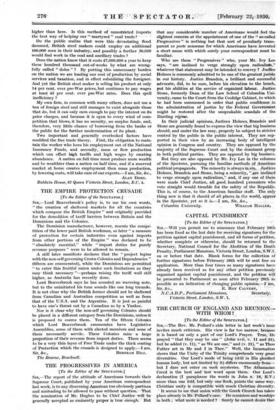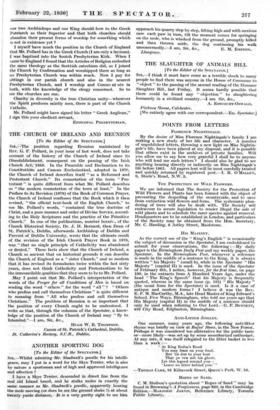THE CHURCH OF ENGLAND AND REUNION—, 'VVITII WHOM ?
[To the Editor of the SPECTATOR.] SIR,—The Rev. Mr. Pollard's able letter in last week's issue invites much criticism. His' view is far too narrow, because it is based on only a part- of one Lord's Prayer. True, He prayed " that they may be one " (John xvii, v. 11 and -21), but he added (v. 11), " as We are one," and (v. 21), " as Thou Father art in Me and I in Thee." Well, the Incarnation shows that the Unity of the Trinity comprehends very great diversities. Our Lord's- mode of being (still in His glorified hunian body, but net limited by it) differs -enormously from=- but I dare not enter on -Such. mysteries. The Athanasian Creed is the best "arid last' word upon them. Our Lord's declaration (I paraphrase the words in John x. 16, RAT:) more thin One fold, but only one'flock, points the same way. Christian unify is compatible with- much Christian diversity.
It seems to me that union with the Greek Church has taken place already in Mr. Millard's case. He ministers and worships in both ; what- more is needed.? • Surely he-cannot desire that
our two Archbishops and our King should -bow to the Greek Patriarch as their Superior and. that both churches should abandon their present forms of worship for something which is not in existence yet ?
I myself have much the position in the Church of England that Mr. Pollard has in the Greek Church (I am only a layman). I was baptized into the Scotch Presbyterian Kirk. When I came to England I found that the Articles of Religion embodied the same theology as the Scottish catechism did, so I joined the Church by Confirmation and worshipped there as long as no Presbyterian Church was within reach., Now I pay for sittings in our parish church and also in the nearest Presbyterian Church, and I worship and Comm ni _ate in both, with • the knowledge of the clergy concerned. So to me the churches are one.
Charity in diversity is the true Christian unity—wherever the Spirit produces saintly men, there is part of the Church Cat holic.
Mr. Pollard might have signed his letter " Greek Anglican," I sign this your obedient servant,
EPISCOPAL PRESBYTERIAN.











































 Previous page
Previous page